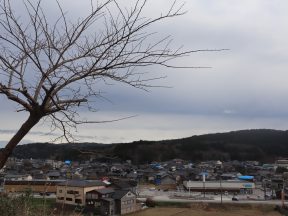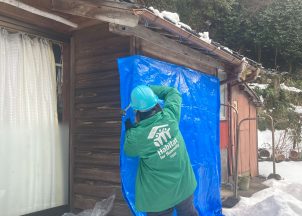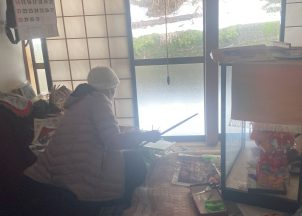 In the Mozen-machi district of Wajima City, Ishikawa Prefecture, the earthquake caused significant damage to the old homes lining the streets of the mountainous, aging, and underpopulated area. Last week, we helped one elderly evacuee “M-san” cover their damaged home with tarps to protect it from the elements in the higher mountainous region of Monzen-machi.
In the Mozen-machi district of Wajima City, Ishikawa Prefecture, the earthquake caused significant damage to the old homes lining the streets of the mountainous, aging, and underpopulated area. Last week, we helped one elderly evacuee “M-san” cover their damaged home with tarps to protect it from the elements in the higher mountainous region of Monzen-machi.
We met M-san at an evacuation shelter. Upon hearing her story, we learned that she relied on a community bus in Monzen-machi, “Mon-chan” to carry out their daily errands and groceries. 4 weeks after the earthquake however this community bus route has yet to be resumed, and people like M-san who have no friends or family living near by have lost an important piece of support from their daily lives. When we met M-san, she hadn’t been able to revisit her home even once since the earthquake.
“My house is still standing and that’s what matters. There’s some broken bits, but since I live alone all I’ll need is one room in good shape to live in. Once running water’s back, and once the bus starts running again, I can support myself so I want to move back home then. My son, he lives in Anami (a town bordering Wajima City), and once he’s dealt with the disaster on his end I think he’ll come over here to help me out.”
 To M-san, her biggest worry was that the quake destroyed their doors and that their home was left open all this time. She was worried that with their house exposed, rain and snow blowing in would damage their precious home.
To M-san, her biggest worry was that the quake destroyed their doors and that their home was left open all this time. She was worried that with their house exposed, rain and snow blowing in would damage their precious home.
The day after we spoke with M-san, we gave them a ride to their house to check on it. Once there, we took simple emergency steps to help protect their home including spreading tarps over open doorways.
Upon entering the house, the inside was still a snapshot in time of the moment of the earthquake. Many belongings and parts of the walls were damaged, and it seemed like quite a lot of cleanup would be necessary for M-san to return home. M-san, with their hands full dealing with aftershocks and the bitter cold weather, told us that it was still too early for them to even think about cleaning up yet.
That day, along with spreading protective tarps, we helped M-san collect items from her home that she would need during their continued evacuation. As we grabbed warm coats, comfortable shoes, hangers, and some still-fresh tangerines, M-san showed us her knitting needles and yarn and told us that she used to knit to keep her mind sharp.
Our accompanying staff asked “do you want to bring them to the shelter so you can knit again?”, to which M-san replied “That’s a good idea. Let me go grab something, I think it was by my bed”. Upon searching for a bit M-san found something fallen under their bed. She then showed us a small cup full of glass marbles. Playthings and hobby goods like marbles and knitting needles are important goods to have to keep one’s body and mind moving during difficult times.
 “I was so worried about what would happen to my house, so I’m relieved that the roof is okay. I hope I can make just one room livable again. To be able to go and check on my house and grab my things, I am so happy and so grateful. Thank you!” As we drove back down the mountain with all of Monzen-machi in view, M-san gave us these thanks and told us more stories about her community, her family, and the many disasters she’s overcome in her lifetime.
“I was so worried about what would happen to my house, so I’m relieved that the roof is okay. I hope I can make just one room livable again. To be able to go and check on my house and grab my things, I am so happy and so grateful. Thank you!” As we drove back down the mountain with all of Monzen-machi in view, M-san gave us these thanks and told us more stories about her community, her family, and the many disasters she’s overcome in her lifetime.
When homeowners are ready to return home and tackle tidying their homes, Habitat Japan is prepared to support people like M-san with the necessary supplies and support. To support us as we continue our post-disaster efforts, please check here.
